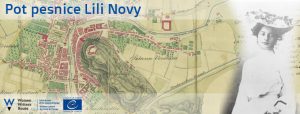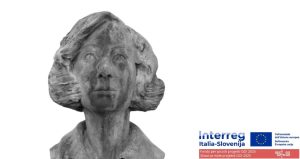DivnaVeković was born in Berane at the end of the 19th century, in 1886 in the village of Lužac, the youngest of seven children. She finished elementary school in her hometown, at the Đurđevi stupovi monastery, after which she went to Skopje for further education.
As she produced enviable results during her schooling she became a scholarship holder of the Girls’ Institute in Cetinje, where she also excelled and became a scholarship holder of King Nikola, which enabled her to continue her education in Amiens in France, after which she would go on to attend the Sorbonne. She graduated from the two-year Dental School in 1917 in Paris. During the First World War, she was engaged in collecting aid for the Serbian army, even though her place of permanent residence was Paris. She came to Yugoslavia in 1939 to celebrate the 550th anniversary of the Battle of Kosovo. Shortly after her return to Yugoslavia a new war broke out, and Veković failed to return to France, which is why she spent the occupation in Berane, working in the People’s Administration of Montenegro as a part-time official at the Health Center.
Divna Veković is the first Doctor of Science from Montenegro, the first dentist, and the first translator of Njegoš’s ′The Mountain Wreath′. Veković completed the translation of Njegoš’s text in 1915 in Paris, and two years later the translation was published. The foreword to the French edition of ′The Mountain Wreath′was written by the French author Henri de Renier, who had nothing but praise for the translation, stating that it was one of the most popular texts in Serbian literature. However, the translation of DivnaVeković did not receive similar praise among domestic critics.
There are conflicting opinions among Francophonists about the translation by the wonderful Veković. However, the fact that this young woman from Berane from a highly traditional environment was the first to translate a key work of the Montenegrin canon is certainly of great importance.
In addition to the translation of ′The Mountain Wreath′, Divna Veković also translated Zmaj Jova’s poems, as well as the Life and Customs of the Serbian People, and a collection of folk tales by Vuk Karadžić. Veković is also the author of two dictionaries of the French language and French grammar. She defended her doctoral dissertation in literature in 1926 in Belgrade.
During the wars, Veković was engaged in civil military service and was dedicated to humanitarian and medical work. However, her ideology kept her to the monarchist system, and at the end of World War II she became a refugee. Her death remains unexplained, so a number of different versions on it continue to this day – that she died before the end of the Second World War, and also that she died at Zidani Most in eastern Slovenia. The supposed year of her death is 1944.
After the monarchists were defeated, those who sympathized with or were close to them were slowly forgotten. As a result, Divna Veković was silenced for decades, and she did not manage to gain a different position even after the change of the system. The fact that no documents exist that would help us learn more beyond her translations only serves to further complicate our work on Veković.





